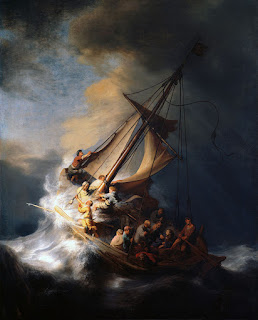All on Our Own: Yet More from Barth at Bremen
 | |
| Christ in the Storm on the Lake of Galilee by Rembrandt. (Public domain, via Wikimedia Commons.) |
The Word in this World: Two Sermons by Karl Barth, trans. Chrisopher Asprey, ed. Kurt I. Johanson (Regent College, 2007). Fürchte Dich nicht! Predigten aus den Jahren 1934 bis 1948 (Munich, Germany: Chr. Kaiser Verlag, 1949), pp. 18-31)
I was once touring the nave of a lovely Episcopal parish. The tour guide pointed to the rafters and noted how they resembled the inverted hull of a ship. With a whiff of pride, as it seemed to me -- though he was not, in my experience, an arrogant person -- he suggested this structure symbolized the church as a ship sheltering it's passengers from the chaos of the outside world.
Karl Barth, I'm convinced, would have none of this.
As Barth marches through the text and the exposition in his Bremen sermon, he explores the profound isolation of the community that follows Jesus as Lord -- those who journey through a hostile world "without weapons" (a phrase elsewhere applied to Barth's distinctively anti-apologetical theological method). The source of this alienation, it so happens, is Jesus himself. In the uniqueness of his divine-human identity, Jesus stands utterly alone, and this very singularity abolishes any claim of superiority over others that his disciples might wish to assert.
In what does this isolation consist? It certainly does not subsist in the moral goodness or uprightness of believers, as if they could stand about other worthy human endeavors, aloof and superior. The very boldness, the starkness, the uncompromising intensity of its proclammation is what sets the community apart; but in pronouncing this word, the community of faith enacts the sign of judgment upon itself. In and through this very proclammation, paradoxically, the very brokenness of the church itself is manifest. This communion of the Crucified becomes an icon and a bearer of the curse of the whole world.
How could humankind in all its dubiousness (or "questionableness" --Fragwürdigkeit) and all its defenselessness (Bedrohtheit) emerge any more clearly than it does here? And how could this venture not secretly be afflicted, and in a particularly intense and severe way at certain moments in time such as this one such as the one in which we are now living? Where should it turn? (p. 49)
The mystery and paradox here is that within its supreme isolation, followers of Jesus share profoundly in his radical solidarity with the human condition in its fallenness and alienation.
What is to become of Jesus' disciples when they find themselves in exactly the same boat as the rest of humanity? They are no better off or stronger than the rest, no less lost and helpless than the world as a whole; indeed, more lost and helpless, perhaps, than all the rest. (ibid.)
A distinguished contemporary school of Christian ethics, claiming Barth as an inspiration and authority, conceives the community of believers as a kind of school of character, a body of "resident aliens" who bear the mark of their distinctive and saving story. I will not attempt to assess that ecclesiology here; suffice it to say, that this is not the sort of construct I read off from this particular sermon. Rather, what we find depicted here is a community that cannot fall back upon the sanctity of its practices and the richness of its communal life. Rather, what marks this community is desparation. Not even the religious consolation of a triumphant Christology allows the church to avoid drinking the cup of bitterness. All the beleagured band of followers can do is cling to the bare word of the promise -- even if they cannot see or feel it. All they have is a memory of their master, a trace.
What else can we do, then, but to cling to what has been given us, cling to the word, and, in spite of our weak attempts at remebering and hoping, to be obedient as far as our ability and understanding allow! (ibid.)
==================================
Follow @jsjackson15


Comments